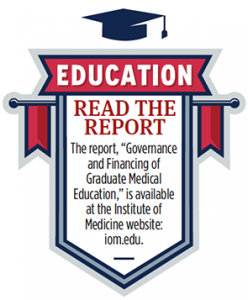
Explore This Issue
April 2015Dr. Tsue said innovations in medical education, such as the use of surgical simulators and information technology, have driven up the costs of residency training exponentially. “It’s a lot different than when we didn’t have technology way back in the dark ages when I trained,” he said. “All that costs more money. To train a resident now is so much more expensive, and every year it gets much worse.”
New Funding Sources?
Dr. Tsue said that since funding hasn’t kept pace with the need for more residency slots, programs have had to be creative in finding alternative sources, including private funding and clinical revenues. But most programs, he said, fund approximately half of their slots using federal dollars, and no other mechanism exists that will fill the gap if federal funding is discontinued.
As the IOM report noted, in 2012 alone, public tax dollars contributed more than $15 billion to support residency training, with more than 90% coming from Medicare and Medicaid.
“The absolute biggest issue is that I don’t know where the funding will come from,” said Stacey Gray, MD, director of the Harvard Medical School Otolaryngology Residency Program in Boston. “Most of the people going into medicine are already fairly in debt when they start their residency training, and they continue to stay in debt during that time because the salary is significantly different than it is for full-time physicians. You’re going to stop attracting the very brightest people into the field of medicine if you’re having a funding problem.”
Dr. Tsue agreed. “There’s really no other mechanism that will be able to fill the gap in terms of training these residents.” Eventually, medical schools will find themselves with fewer students, he said. “The government is pushing for the training of more medical students but not producing more jobs for training them. No one will go to medical school if they can’t get a job afterward,” he said.
Funding Surgical Specialties Versus Primary Care
Otolaryngology may not be affected as strongly as other specialties by a reduction in Medicare GME funding, however. Without federal funding, hospitals that fund GME out of their operating revenues are more likely to continue to do so in the more profitable surgical specialties such as otolaryngology, rather than in primary care, said family medicine physician John Zubialde, MD, associate dean for graduate medical education at the University of Oklahoma School of Medicine in Oklahoma City.